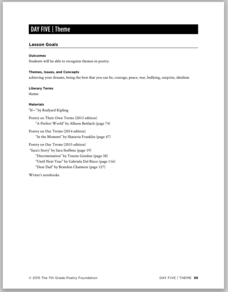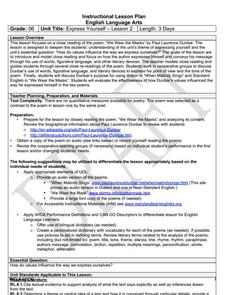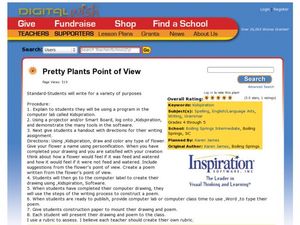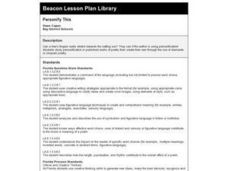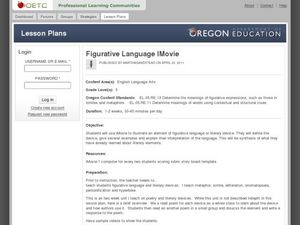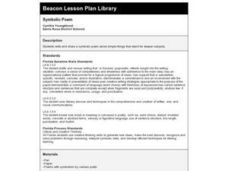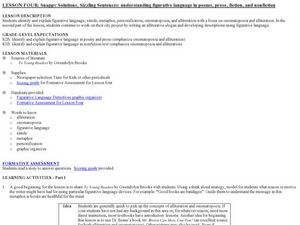Curated OER
Bringing Household Items to Life
Use folk tales as inspiration for learning about and using personification in creative writing. Learners brainstorm together in order to practice personification before writing their own poems or paragraphs about a household object.
Curated OER
Personification Lesson Plans and Resources
This resource on personification provides three different approaches aimed at different levels. The first, appropriate for upper elementary, provides examples of personification, followed by an exercise that requires replacing a word in...
Curated OER
Extreme Poetry Vocabulary
Challenge your class with this comprehensive list of literary vocabulary words. Learners take a pre-test, look up definitions, come up with an example, and then take a post-test. You might use this prior to a unit about poetic devices in...
Curated OER
Making Objects Human
Explore poetry, personification, and multiple languages with a poetry reading and writing activity. After the teacher reads the poem to the class, a discussion about personification follows. The class then writes a collaborative poem...
Curated OER
Theme
A study of Rudyard Kipling's poem, "If," launches a lesson about theme. Class members read Kipling's poem and poems by other seventh graders to identify the themes.
Curated OER
6th Grade: Express Yourself, Lesson 2: Close Read
The second lesson plan of a pair about Paul Laurence Dunbar, this plan focuses in particular on his poem, "We Wear the Masks." After a short historical introduction, class members conduct a series or readings, marking up the text and...
Curated OER
Poetic Devices
Introduce middle schoolers to poetic devices with a lesson that asks them to find examples of alliteration, anaphora, onomatopoeia, metaphors, similes, and personification in various poems. Young scholars craft examples of these poetic...
Curated OER
Pretty Plants Point of View
Young poets use Kidspiration to draw a flower, personify the flower, and write a poem from the flower's point of view. Sharing these poems in small groups will reinforce learners' knowledge of personification.
Curated OER
Searching for Images in Poetry
Young scholars are introduced to the concepts of similes, metaphors and personification. In groups or individually, they read different poems identifying the similes, metaphors and instances of personification in each. They record all...
Curated OER
Figurative Language in Poetry and Prose
Students examine the impact of sound devices in poetry. In this poetry lesson, students read the listed poems and identify uses of hyperbole, simile, metaphor, imagery, and personification. Students discuss how sound devices enhance poetry.
Curated OER
Expressing Our Thoughts Through Poetry
Students create a poem on about spring. They read final version of their poem chorally. They write reflections of their experience in creating the poem.
Curated OER
A Voice for Hard Issues
Ouch! The final lesson in the 12-resource poetry unit models for young writers how poems can be used to voice hard truths.
MENSA Education & Research Foundation
Magical Musical Tour: Using Lyrics to Teach Literary Elements
Language arts learners don't need a lecture about poetry; they listen to poetry every day on the radio! Apply skills from literary analysis to famous songs and beautiful lyrics with a lesson about literary devices. As class...
Curated OER
Personify This
Eighth graders study personification in published works of poetry, then create their own through the use of diamante or cinquain poetry. They read and discuss poetry by Shel Silverstein, William Jay Smith, and Elinor Wylie.
Curated OER
Carl Sandburg's "Chicago": Bringing a Great City Alive
Students examine the historical and cultural context in Sandburg's poem. The poetic devices of personification and apostrophe are utilized in the poem and identified by Students.
Curated OER
Figurative Language iMovie
In order to understand figurative language, learners read 5 poems, each exemplifying a different literary device. They discuss and write responses to each poem. They then choose one literary device which they will use as the basis for a...
Curated OER
Figurative Language
What is figurative language, and why do we use it? Introduce your high schoolers to some examples and discuss the importance of including this element in your writing. After studying a text and searching for examples, writers will...
Curated OER
Figurative Language
Students interpret figurative language. In this language lesson, students are read the poem "I Love the Look of Words" by Maya Angelou and are to find examples of hyperbole and personification in the poem. Students then rotate among...
Curated OER
Pictures in Words: Poems of Tennyson and Noyes
Learners examine how Tennyson and Noyes use words to paint vivid pictures. They read and analyze two poems, complete an online scavenger hunt, complete a worksheet, and write examples of alliteration, personification, metaphor, simile,...
Curated OER
Poetry of Abraham Lincoln
Fourth graders analyze Abraham Lincoln's poems "The Bear Hunt" and "My Childhood's Home" for word choice and deeper inquiry into the vocabulary he uses to convey emotion. They identify rhyming words and patterns in these poems. ...
Curated OER
Pictures in Words: Poems of Tennyson and Noyes
Students analyze poems by Tennyson and Noyes. They identify examples of alliteration, onomatopoeia, personification, metaphor, and simile. Students create examples of alliteration, onomatopoeia, personification, metaphor, and simile.
Curated OER
Personification Stories
Students create a clay object in which they are to personify. They use their own personal experiences to help the viewer imagine what it would be like to be that particular object. They also watch videos of fables to help them with...
Curated OER
Symbolic Poem
High schoolers read and analyze several highly symbolic poems. They create their own symbolic poem, read it to the class, and discuss whether they can guess any hidden meanings.
Curated OER
Snappy Solutions, Sizzling Sentences
An examination of the figurative language in Gwendolyn Brooks’ To Young Readers challenges your writers to think about the richness of language. Ask your class why Brooks says, “Good books are bandages.” This discussion of alliteration,...






